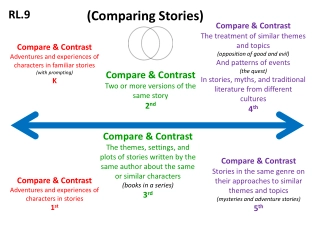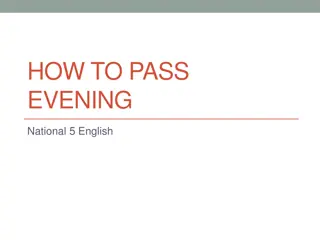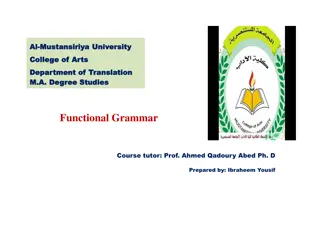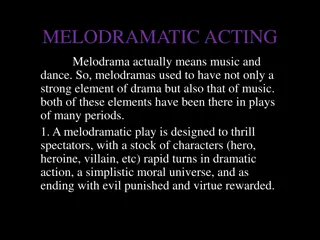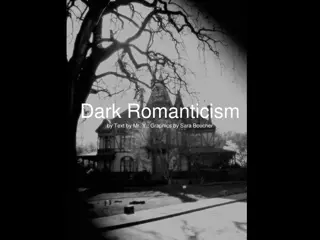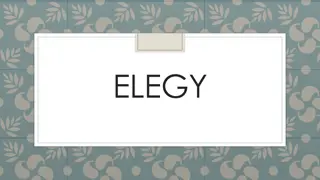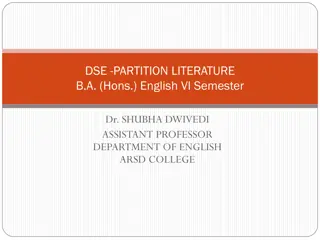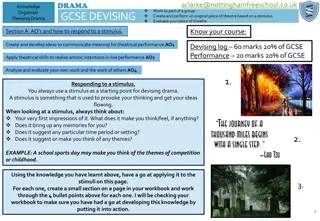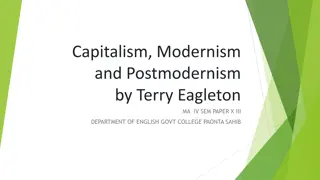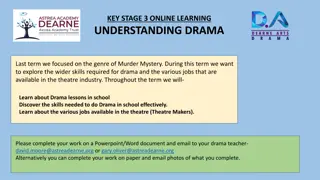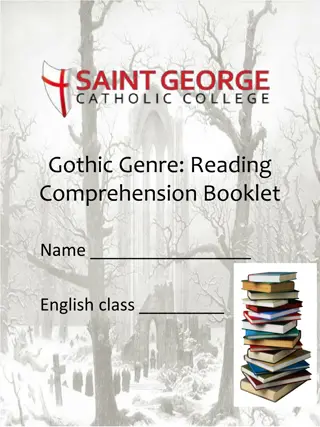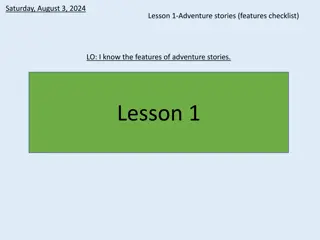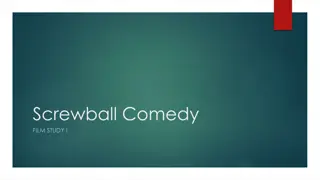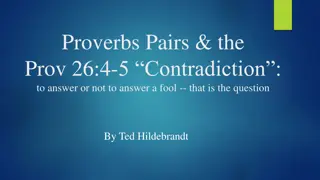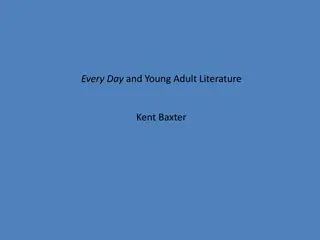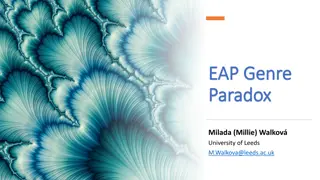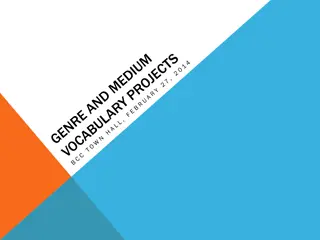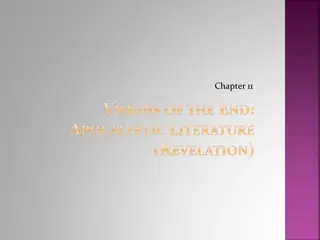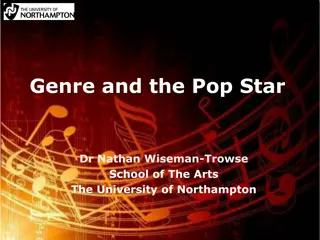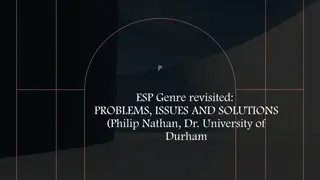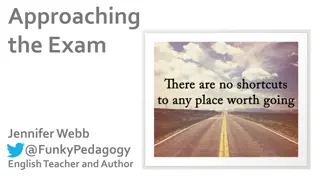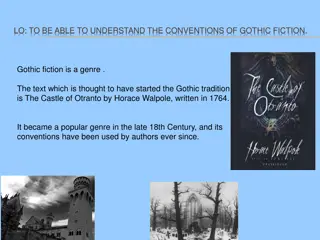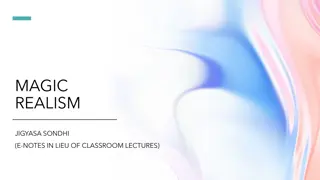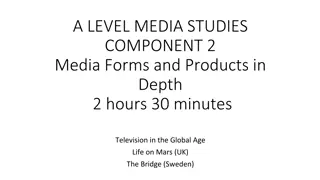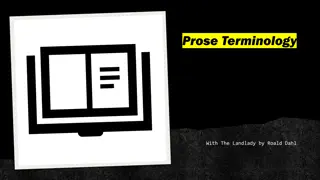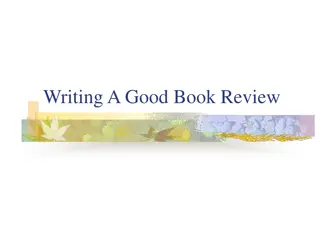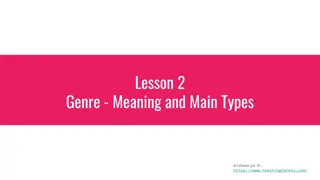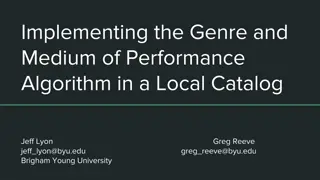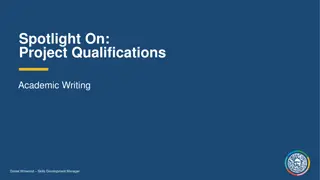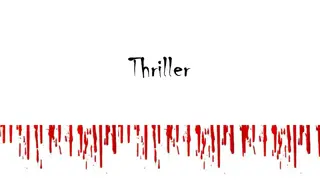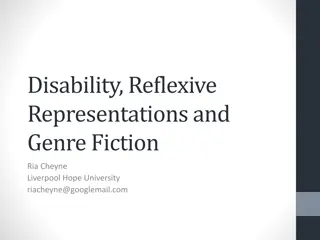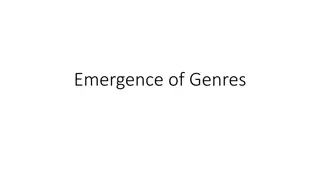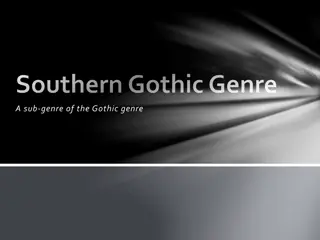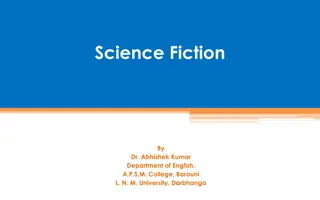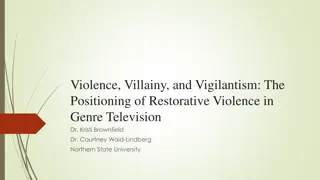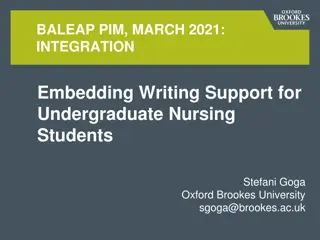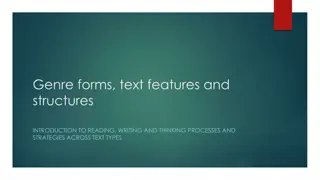Comparative Analysis of Stories Across Cultures
Explore the comparative analysis of stories by comparing themes, settings, and characters across different cultures and authors. Dive into various adventures and experiences of characters in familiar and traditional stories. Understand the treatment of similar themes and topics like good versus evil
2 views • 8 slides
National 5 English Course Overview and Assessment Details
This National 5 English course covers detailed text analysis, critical essay writing, individual presentations, and group discussions. Students will study Scottish texts, genre texts, and non-fiction for understanding, analysis, and evaluation. Assessment includes internal assessments and a final ex
1 views • 20 slides
Understanding Systemic Functional Linguistics in Contemporary Language Studies
Explore the role of language in everyday life, the principles of Systemic Functional Linguistics, and the application of discourse analysis in translation. Delve into the Hallidayan model of language and discourse, examining genre, register, sociocultural environment, and more.
0 views • 20 slides
Understanding Melodramatic Acting in Theatre
Melodramatic acting in theatre combines elements of drama, music, and spectacle to create thrilling performances for audiences. These plays feature stock characters, rapid dramatic action, and a simplistic moral universe where good triumphs over evil. Actors in melodramas must master melodramatic sp
0 views • 7 slides
Dark Romanticism: Exploring a Gothic Literary Sub-genre
Overview of Dark Romanticism, a literary sub-genre emerging from the Transcendental movement but notably less optimistic. Explore its characteristics focusing on the tragic, characters prone to sin and self-destruction, and nature depicted as dark and mysterious. Learn about notable authors like Edg
0 views • 11 slides
Understanding Elegy: A Poetic Tribute to the Deceased
Elegy is a form of literature, often a sad poem or song, written to honor and mourn someone who has passed away. It expresses sorrow and praises the deceased, reflecting on mortality and the impact of loss. Pastoral elegies, rooted in classical mythology, also play a significant role in this genre.
0 views • 8 slides
Exploration of Partition Literature in Indian English Fiction
Political partition in India led to a significant literary genre known as Partition Literature. This genre explores the socio-historical impact of the partition era through novels and short stories, offering alternative histories and personal perspectives on this defining event. Notable works by aut
0 views • 14 slides
Devising Drama - GCSE Knowledge Organiser
This GCSE Drama Knowledge Organiser provides guidance on devising and performing an original piece of theatre based on a stimulus. It covers how to respond to stimuli, develop ideas for theatrical performances, apply theatrical skills, analyze and evaluate work, and rehearse and refine the devised p
0 views • 10 slides
Understanding Capitalism, Modernism, and Postmodernism in Literature
Terry Eagleton's essay delves into the impact of capitalism on art and literature, exploring the emergence of modern and postmodern literature in the capitalist and late capitalist eras. He discusses how late capitalism influences art with characteristics like mass consumerism and virtual reality. P
1 views • 7 slides
Exploring Drama Skills and Theatre Jobs in Key Stage 3 Online Learning
Dive into the realm of drama in Key Stage 3 online learning focusing on developing a broader understanding of drama skills beyond Murder Mystery genre exploration. Uncover the necessary skills for effective drama engagement in school, explore various jobs in the theatre industry, and reflect on the
0 views • 8 slides
Understanding the Gothic Genre Through Reading Comprehension Booklet
Dive into the mysterious world of the Gothic genre with a reading comprehension booklet featuring texts that will challenge your comprehension skills. Explore the eerie atmospheres, detailed descriptions, and captivating narratives that define this intriguing literary genre. Enhance your reading str
0 views • 15 slides
Understanding Adventure Stories: Features and Characteristics
Delve into the world of adventure stories in this educational lesson. Explore the key features of adventure narratives, including escaping danger, quests, and extraordinary experiences. Engage in interactive tasks and discussions to deepen your understanding of this exciting genre.
0 views • 13 slides
Unraveling the Charm of Screwball Comedy Films
Dive into the world of screwball comedy films, a genre that emerged in the mid-1930s, characterized by zany events, witty dialogue, and battles of the sexes. These films disrupt the ordered lives of heroes with the arrival of heroines, leading to humorous misadventures and satirical takes on social
0 views • 7 slides
Understanding Drama Form and Genre
Exploring the nuances of drama, this content delves into the intricate relationship between form and genre. Offering insights into the varied types of forms in drama such as scripted plays, physical theatre, mime, monologues, movement/dance dramas, musicals, and pantomimes, it emphasizes the flexibi
0 views • 17 slides
Understanding the Proverbs of Proverbs 10-24: Contextual and Genre Insights
Exploring the arrangement and connections within Proverbs 10-24 to uncover the deeper meaning and significance of the proverbial wisdom. Analyzing the importance of context and genre in determining the meaning of words and the messages conveyed in biblical texts like Psalms and Proverbs.
0 views • 48 slides
Exploring the Origins and Evolution of Gothic Literature
Gothic literature traces its roots back to Horace Walpole's novel "The Castle of Otranto," characterized by medieval settings, supernatural elements, and themes of terror and fear. Writers like Mary Shelley, Bram Stoker, and Edgar Allan Poe further popularized the genre with works such as "Frankenst
0 views • 6 slides
Understanding Young Adult Literature and Identity Formation
Young Adult literature caters to readers aged 12-18, exploring themes of adolescence, individuation, and identity formation. This genre faces challenges due to evolving definitions and adult readership. Characters navigate the journey of self-discovery, integrating self and community while examining
2 views • 9 slides
Understanding Social and Discoursal Mismatches in Academic Writing Genres
Exploring the challenges of social and discoursal mismatches in academic writing genres, this content delves into issues of pedagogy, audience perceptions, purposes of writing, and structural/language differences between student and expert genres. It highlights the complexities students face in navi
0 views • 15 slides
Understanding Genre and Form in Works
Genre and form in works help categorize them based on similarities in plot, theme, setting, or characters, while closely related concepts include characteristics of the audience and creator, place and time of creation, and the language of composition. LCMPT and LCDGT are used for detailing the mediu
0 views • 25 slides
Understanding Apocalyptic Literature in Revelation
Explore the fascinating genre of apocalyptic literature through an in-depth study of the Book of Revelation. Delve into the historical background, interpretative approaches, and essential elements of this profound genre that envisions the end times. Discover how apocalypticism merges earthly circums
0 views • 39 slides
Understanding Genre in Popular Music: Exploring Uses and Interpretations
Delve into the intricate world of music genre as it influences perceptions, expectations, and industry strategies. Discover the dynamic interplay between genre, style, and audience reception while unraveling the significance of genre as a navigational tool in music landscapes.
0 views • 15 slides
Revisiting PESP Genre: Problems, Issues, and Solutions
This discussion revisits the problems and issues associated with communicative purpose and social purpose in ESP/Swalesian genre analysis. It delves into the definition and differentiation of communicative purpose (CP) and social purpose (SP), offering insights into their roles in text classificatio
0 views • 20 slides
Mastering Exam Writing Techniques for English Literature
Prepare effectively for your English literature exams by understanding the importance of clarity, structure, and accurate writing. Focus on genre understanding, textual references, and using language you comprehend. Avoid unnecessary comparisons and apply critical theory subtly to enhance your respo
0 views • 12 slides
Understanding Gothic Fiction Conventions in Literature
Gothic fiction is a captivating genre rooted in dark, mysterious settings, supernatural elements, and eerie atmospheres. Originating with "The Castle of Otranto" by Horace Walpole, this genre has evolved to encompass elements like family curses, isolated castles, and sinister creatures. Dive into th
0 views • 25 slides
Exploring Magic Realism in Literature
Magic Realism is an artistic genre that blends magical elements with realistic settings, intertwining external and internal realities. Popularized by writers like Marquez and Borges, it challenges traditional narrative structures and blurs boundaries between the real and the fantastical. This genre
0 views • 9 slides
Analysis of Genre Elements in Life on Mars and The Bridge
Television series like Life on Mars (UK) and The Bridge (Sweden) exemplify various genre theories and narrative structures. From discussing social, cultural, economic, and political factors affecting production to exploring media language and Neale's Genre Theory, these shows showcase how genres osc
0 views • 13 slides
Analyzing "The Landlady" by Roald Dahl
The analysis of "The Landlady" by Roald Dahl delves into key elements such as plot, setting, point of view, characters, theme, and genre. The story portrays how appearances can be deceiving as a seemingly harmless landlady turns out to be a sinister character. Through a third-person limited omniscie
0 views • 10 slides
Writing A Good Book Review
Learn the essential elements to craft a good book review, including providing genre details, personal opinions, and a captivating summary without revealing the final event. Follow a structured format with key paragraphs allocated for genre introduction, personal reflections, detailed summary plannin
0 views • 12 slides
Understanding Genre: Meaning and Main Types in Writing, Movies, and Music
Genre refers to a specific type of writing, movies, or music that shares distinct features. It helps classify books and other media forms. Various genres exist, including action, comedy, thriller, romance, fantasy, biopic, jazz, pop, classical, Carnatic, Hindustani, and metal. While genre is one way
0 views • 16 slides
Implementing Genre and Medium of Performance Algorithm
This project outlines the process of implementing an algorithm to categorize music records based on genre and medium of performance. Starting with a test run, the algorithm processes music MARC records, identifies headings, and generates output files. The initial evaluation reveals changes made, pot
0 views • 21 slides
Genre Approach to Academic Writing
Explore the genre approach to academic writing focusing on purpose, audience, and organization. Learn about different genres, key elements of writing, and the importance of analysis. Discover how to structure your introduction, body paragraphs, methods, results, conclusion, and discussion effectivel
0 views • 23 slides
Evolution of Thriller Genre: From Crime Retribution to Psychological Imbalance
The history of the thriller genre traces back to the 17th century with themes of crime retribution evolving into entertainment by the 19th century. Crime was viewed as a social problem in the late 20th century, leading to the emergence of detective and criminal noir styles. Psycho thriller narrative
0 views • 6 slides
Disability, Reflexive Representations in Genre Fiction: Exploring Cultural Perspectives
Disability studies, a vital academic discipline, delves into societal perceptions and policies around disability, challenging norms through evaluative and positive-image approaches. This exploration includes cultural analysis, critical assessments, and nuanced representations in genre fiction, offer
0 views • 18 slides
Understanding the Emergence of Genres in Media: A Study of Innovation and Evolution
The emergence of genres in media is a fascinating process that involves the development of new types of content within both traditional and digital platforms. From the rapid rise of blogging to the evolution of genres in personal media like selfies, researchers explore how innovation and technology
0 views • 18 slides
Southern Gothic Genre, Magical Realism, and Their Characteristics
Southern Gothic Genre is a sub-genre of the Gothic genre characterized by settings in the South, eccentric flawed characters, grotesque activities, irony, and social commentary. Magic Realism combines realistic events with surreal elements, portraying world views through others' eyes and experiences
0 views • 4 slides
Evolution of Science Fiction Literature
Science fiction genre, blending imaginative fantasy with scientific principles, has evolved significantly over time. Initially emerging in the late 1800s, it gained popularity alongside technological advancements. Theodore Sturgeon highlighted the essence of human stories within the genre. Iconic wo
0 views • 8 slides
Exploring Restorative Violence and Vigilantism in Genre Television
Delve into the portrayal of violence, villainy, and vigilantism in popular genre TV shows like Buffy the Vampire Slayer, Angel, and Supernatural. The analysis covers themes of good and bad vigilantes, racial motivations, narrative justifications, and the characterization of villains, offering insigh
0 views • 8 slides
Integrating Writing Support for Nursing Students: A Genre-Based Approach
Designing writing support for undergraduate nursing students involves understanding the cohort's unique needs, such as time constraints and diverse learning backgrounds. Using a genre-based approach, which focuses on analyzing specific student genres, can enhance instructional materials and improve
0 views • 17 slides
Rock Music: A Brief Overview of an Iconic Genre
Rock music is a powerful form of music with a distinct beat and simple tunes, often played loudly with electric guitars and drums. Originating in the United States in the 1950s, rock music quickly spread globally, influencing cultures across the world. The genre has seen the rise of iconic bands lik
0 views • 4 slides
Understanding Genre Forms, Text Features, and Structures in Reading, Writing, and Thinking
Explore the world of genre forms, text features, and structures in this engaging session. Learn to classify different texts, recognize generic features, and understand the main literary genres including prose, poetry, and drama. Delve into the nuances of prose writing, the musical quality of poetry,
0 views • 22 slides
